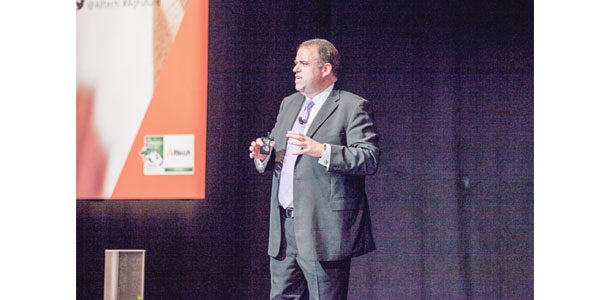The problem with creating a business plan is: Very often, farmers write the plan then leave it to one side, albeit with the best of intentions.
“Farmers are natural entrepreneurs and business leaders. They find it easy to identify great ideas and opportunities to change their business today, but many don’t understand how, or don’t have the tools, to help them change their business when they go back to work tomorrow,” Damien McLoughlin said.
McLoughlin, a professor at UCD Smurfit School of Business, presented “Farm Blueprint – What will you do?” at Alltech’s Global Dairy & Beef in Deauville, France.
The conference, which welcomed 700 attendees from 43 countries in fall 2014, is held annually and brings together some of the most progressive dairy and beef producers from around the world to enable them to network, share experiences and discuss plans for the year ahead.
McLoughlin urged attendees to think outside the box and look toward Silicon Valley entrepreneurs as an example for embracing innovation, creating the future of their business and focusing on opportunities that provide a greater profit.
While processing houses can often be seen as bandits that harm profitability and impose prices on dairy farmers, McLoughlin said producers need to start thinking beyond dairy processing to what they might do differently to grow their business.
McLoughlin advised dairy producers to consider five forms of adjacency growth:
1. New value chain steps – Can you sell direct? Is it actually possible for you to sell directly? Closing the gap between the producer and consumer can help reduce misconceptions about farming.
“You and I have never met a farmer in the world who treats his or her animals badly, or a farmer who is not concerned about the environment, or a farmer who is not committed to healthy animals; the problem is that consumers don’t believe this is the case,” McLoughlin said.
2. New channels – Can you sell in a flea market? On Williamsburg Bridge in Brooklyn, New York, Smorgasboard, a food flea market, opens Saturdays and Sundays to sell high-end products to discriminating consumers.
“People will wait for 40 minutes to have beef brisket from a particular producer and will pay $25 to $35 a pound for beef brisket or beef on the rib because it is good-quality or cooked in a particular way,” McLoughlin said. “People believe it is authentic, and these 60 to 90 producers are becoming experts in their market each week.”
3. New business – Can you build a community around your farm? Agritopia in Gilbert, Arizona, is a part-agriculture, part-ideal community where the goal is to preserve agriculture in an urban environment. The 450 homes on the 160-acre development are centred around a farm.
“This is a new idea in real estate and property management. People like the idea of living on a farm,” McLoughlin said. “Why don’t we build housing and then put a farm at the centre of it? It is a totally new idea springing up around the U.S., all with the farm at the centre and the farm at the core business.”
4. New geographies – Are you where the growth is? McLoughlin said that despite some negative publicity, there are enormous opportunities in China.
“There are 1.2 billion people who live there: 300 million people have their needs met, 900 million people’s needs are not met, and they still want to buy what you have to sell. Why are you not selling there?” McLoughlin said.
He gave the example of Costa Rica dairy cooperative Dos Pinos that found challenges in the Central America market with retailers and competitors but have found success expanding their horizons to China.
This year the company will sell 100 container loads of dry powder milk in the Chinese market; last year, they only sold 40. McLoughlin is sure the company will sell 300 to 400 container loads next year.
5. New products – Are you using your gifts? Chobani markets their Greek yogurt product as a gift from nature and built their business model on integrity and authenticity.
Hamdi Ulukaya, founder and CEO of Chobani, found after moving to New York from his native Turkey that yogurt wasn’t as delicious and widely available as it was back home. He believed everyone deserved better options, so he set about making delicious, nutritious, natural and accessible Greek yogurt.
“With that kind of mindset, Hamdi has made a premium yogurt and has taken out the competition,” McLoughlin said. “Are you using your gift?”
McLoughlin said these means of adjacent growth can prove challenging because producers often spend so much time looking after their business that it is difficult to respond to all the changes consumers are constantly demanding.
It is important, however, to remember we are surrounded by opportunities. McLoughlin said the only way to succeed is follow the Silicon Valley example by learning faster than the competition, experimenting through building and measuring success.
“There is absolutely no doubt in my mind that farmers are the most skillful entrepreneurs because of their ability to respond to this volatility that exists in agricultural markets around the world,” McLoughlin said. “We need to think differently about opportunities. We need to focus on innovation, profitable growth and increasing our sales overall.” PD
PHOTO
Damien McLoughlin, a professor at UCD Smurfit School of Business, presented “Farm Blueprint – What will you do?” at Alltech’s Global Dairy & Beef in Deauville, France. He urged attendees to think outside of the box and look toward Silicon Valley entrepreneurs as an example for embracing innovation, creating the future of their business and focusing on opportunities that provide a greater profit. Photo provided by Alltech.
Alltech







